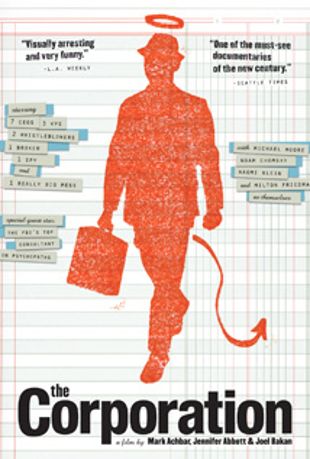
It's not easy to make an entertaining documentary -- running nearly two and a half hours, no less -- about a subject that most audiences find too depressing, challenging, and complex to foster engagement. Remarkably, The Corporation does just that, its achievement all the more laudable for taking on a topic whose very nature is amorphous and hard to identify. As the title indicates, that topic is the corporation itself -- that faceless but omnipresent body that, in the guise of countless business and manufacturing organizations, exerts massive influence over modern industrial life. The left-leaning politics of the filmmakers are apparent, but never in a dogmatic way, as they break up the movie into numerous sections diagnosing and offering prognoses for the corporation, as if that entity was a psychiatric patient. To no surprise, the corporation comes off roughly equivalent to the most disturbed mentally ill individuals, acting without guilt, shame, or consideration of consequences that include environmental devastation, disregard for personal and legal rights, and wanton exploitation of third-world peoples and resources (and much more, but a complete list would necessitate several capsule reviews). Sound dry? It isn't, because the filmmakers cannily employ witty graphics, stock footage, and above all, fascinating interviews to illustrate the history of the growth of the destructive power of corporations, fast-paced and well edited.
The interviewees include some of the usual suspects you'd expect to show up in such a film -- Noam Chomsky, Michael Moore, and Howard Zinn, for instance -- but many more less celebrated figures comment, sometimes guardedly and sometimes surprisingly frankly, on the monstrous but relatively anonymous behavior corporations generate. Some of them, one suspects, end up giving away more than they really want to. What's even more chilling than the environmental damage and human exploitation that corporations wreak is the guileless, almost gleefully willful co-option of some of the interviewees into the corporate process, like the university students whose studies are actually "sponsored" and paid for by corporations; the Shell executive who claims that he shares the same goals as protesters against his company's environmental policies; or the guy who makes a living being a deceitful corporate infiltrator-spy of sorts. In this way, it's suggested that part of the corporate malady is the human character itself. It's a depressing, if informative and thought-provoking, prognosis, though ameliorated slightly by a more hopeful closing section documenting some pockets of resistance to the corporate danger, most movingly through a carpet manufacturer who actually seems sincerely dedicated to making his business more ecologically responsible.
